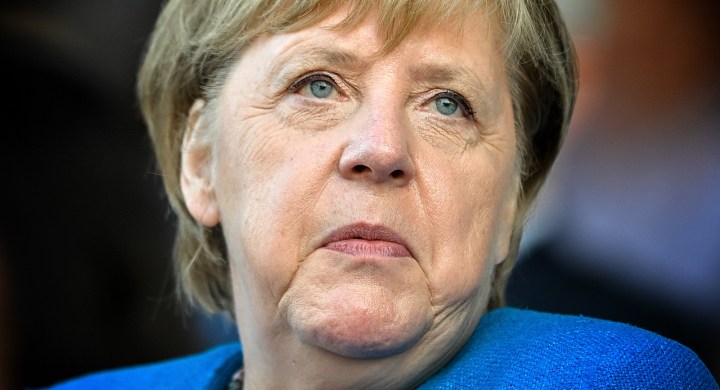OP-ED
Life after Angela: The end of the Merkel era sets the stage for a tragicomedy in Germany

With Angela Merkel retiring after 16 years at the helm of Europe’s biggest economy, the outcome of the September German elections is anything but predictable. One spectre is that the right-wing populist Alternative for Germany gets into a coalition government simply because a governing coalition needs the backing of the Bundestag to pass legislation.
Thomas Koelble is Professor of Business Administration in Political Science at the Graduate School of Business, University of Cape Town.
On 26 September 2021 Germans will go to the polls and elect a new government. Angela Merkel’s reign as Chancellor of Germany will come to an end — that much is certain. But who will take over the reins of government is uncertain. The election campaign so far has been a tragicomedy and reveals deep rifts within all the political parties.
A few months ago, opinion polls indicated that the environmentalist Green Party was set to pull off an amazing upset: it was leading the big political parties by a slender margin. For most of the post-war period, the two main political camps were the twin parties of the conservative Christian Democratic Union (CDU) and its Bavarian sister party, the Christian Social Union (CSU) on the one side and the Social Democratic Party (SPD) on the other.
Sandwiched between these two blocs was the Free Democratic Party (FDP), a small liberal party. The FDP’s main claim to fame is that it has, on several occasions, held the balance of seats in the Parliament/Bundestag. It thereby determined whether the government would be a CDU/CSU/FDP coalition or an SPD/FDP coalition.
German electoral law stipulates that only parties with more than 5% of the vote can hold seats in the Bundestag and these four parties formed coalition governments (SPD/FDP in much of the 1970s and 80s and the CDU/CSU in the period from 1949 to 1966 and again in the late 1980s and 1990s). The Greens emerged as a political force in the 1970s and entered the Bundestag for the first time after the 1983 elections. The party first entered a governing coalition with the SPD when Gerhard Schroeder became chancellor in 1998. This coalition lost power to Merkel’s CDU/CSU in 2005 which then governed the country through a major financial crisis, Brexit and Covid.
With the unification of Germany in 1990, another party entered the political fray — the Party of Democratic Socialism (PDS), the successor of the East German Socialist Unity Party (SED). This party had its stronghold in East Germany and eventually merged with several smaller political groupings to form The Left or Die Linke.
And, if this was not enough, in recent years the radical right has spawned its own political party — the Alternative for Germany (AfD). It started as an anti-Euro/anti-EU party but developed into a right-wing populist party similar to the French National Rally. The AfD also has strong support in the former East Germany.
So, when the 2021 election campaign kicked off, the Greens were out of the blocks quickly and successfully. Their chancellor candidate, Annalena Baerbock, set the political stage on fire — young, energetic, ambitious and photogenic, she launched a charm offensive and seemed to be a shoo-in as a replacement for Mutti Merkel. She and the Greens enjoyed more support than the CDU/CSU at more than 26% of the national vote. It appeared as if Baerbock was on her way to becoming a Green and German version of Jacinda Ardern in New Zealand.
But things went horribly wrong. The German media is adept at checking people’s CVs and post-graduate dissertations. Several government ministers have had to resign because they plagiarised, and lost their PhDs as a result. Baerbock’s CV turned out to contain numerous inaccuracies and inflated claims. When her much-awaited book appeared outlining her concepts and ideas, it turned out to contain large copy-and-paste passages. As quickly as she rose to the top of the pops, her personal and her party’s popularity plummeted.
Her running partner, Robert Habeck, enjoys widespread popular support, but the course of the Green Party to become a broad “people’s party” is a strategic and organisational gamble and is questioned by many within the party.
Things are not a lot better in the CDU/CSU camp. Over the past few years, the party has slipped in the polls from a base of support around 40% to its current 23%. Here two political heavyweights clashed over who is to succeed Merkel.
In one corner, Armin Laschet, the CDU premier of the state of North-Rhine Westphalia; in the other, Markus Soeder, the CSU premier of Bavaria. Laschet won the leadership battle over Soeder simply because he represents the larger of the two parties. However, the contest between the two candidates became so contentious that it almost led to a split between the two parties. Moreover, it appears that Soeder is regarded as a more suitable candidate for chancellor than his opponent, leading Laschet in most polls.
Soeder cannot help but score points against the hapless Laschet, who has obliged with several public faux pas. Laschet tried to escape the media frenzy by avoiding public appearances. Only once Baerbock committed political hara-kiri, did he reappear to take some initiative and immediately performed a spectacular act of self-immolation.
Usually, catastrophes are phenomenal events for politicians because they afford them the opportunity to show leadership in times of crisis, that they care and can make a difference to the victims. However, they also bear dangers. Shortly after massive floods devastated several towns, President Frank-Walter Steinmeier held a speech to console the victims. Laschet, seated behind the president and in clear view of the TV cameras, inexplicably succumbed to the giggles while Steinmeier addressed the nation. Laughing, it turns out, is not a laughing matter when your president is expressing his condolences to citizens who have just lost their loved ones.
So, this leaves the SPD and its candidate, Olaf Scholz. With the implosion of both Laschet and Baerbock, Scholz did not have to do anything to gain popularity. Utterly predictable, lacking any charisma, and with monotonous delivery, he has ridden the wake of destruction left by his opponents. And, lo and behold, his party has improved in the opinion polls from the lowest point in its long history of 14% to a halfway respectable 21%.
Scholz, and the SPD, is now just a few points shy of the CDU/CSU and Laschet. The party, however, is a shadow of its former self as it lacks its former social base in the unions and the working class. Given the track record of everyone else, it seems only a matter of time until this candidate also pours petrol over his campaign and sets fire to his party.
But, of course, there are others in the running. The right-wing AfD is plodding along at around 11% of the vote, which, in a country with such a horrific history of right-wing fanaticism is quite worrisome in and of itself. The party is deeply split into a “liberal” wing (a German version of the Brexit movement in Britain) and a radical right-wing that focuses on issues such as the “invasion” of Germany by refugees, immigrants and has a decidedly xenophobic and racist streak.
This Janus-like appearance serves the party well, as its more “acceptable” face in Alice Weidel offsets the nasty politics of racism. The rift between the fascists in the party and ultra-conservative liberals/nationalists is deep and plastered over only by the professions of party unity of its party leaders. Party conferences look more like WWE events than policy discussions. The party has a significant base of support in the former East Germany, especially in Saxony. The current Afghanistan crisis is likely to lead to another refugee stream to Germany and will benefit the party at the polls.
And, on the left, Die Linke is also plodding along with its base of support at around 7% and is just as heterodox as the other political parties. It holds that the rival SPD has lost touch with the working class and its commitment to any form of democratic socialism. In that, it may be spot on.
Yet, its former leader, Sahra Wagenknecht, charged that the party had also lost sight of its core voters and had become a “leftist lifestyle party”. More concerned with their macrobiotic foods and bio-markets, members of Die Linke, Wagenknecht opined, had lost touch with the poor and socially marginalised. Her accusations led to an expulsion process by incensed opponents — she obviously touched a raw nerve. She speaks for a significant group of party members making talk of her expulsion a dangerous strategy for a party that is barely above the electoral threshold for the Bundestag.
The German political parties are associated with colours — green for, you guessed it; red, again pretty obvious but symbolically split between Die Linke and the SPD; black for the CDU; dark blue for the CSU; yellow for the FDP; and light blue for the AfD (though many believe that brown would have been far more appropriate).
All parties have announced that there will be no coalition talks with the AfD, so its situation is clear — it will certainly be in the opposition (or will it?). But apart from that, there is a great deal of speculation as to what coalition might emerge from what is a finely balanced and volatile party landscape. On 24 August the polls indicated the following electoral outcome if elections were held on that day:
CDU/CSU at 23.1%; SPD at 21.1%; Greens at 17.9%; FDP at 12%; AfD at 10.9%; Linke at 6.9%; the rest undecided or voting for even smaller parties.
The questions these potential results raise are: what kind of coalition government is likely to emerge? Which three parties will be able to cooperate to build a coalition strong enough to govern? Will it be a “Jamaica coalition” of black-yellow-green? Another possibility is a “traffic light” coalition of red-yellow-green or even a red-green-red (also known as R2G) one. A potentially unstable outcome would be a minority government that hopes to obtain support from other parties on a case-by-case basis.
There is, of course, also a quite worrisome possibility that the AfD is asked into a coalition government after all, simply because a governing coalition needs the backing of the Bundestag to pass legislation. Given that none of the major parties is likely to emerge with a clear mandate to rule, the electoral campaign promises to heat up significantly in the next few weeks and that post-election politics are likely to be byzantine.
One thing is certain: the rock of German governance, a pillar of Nato and European integration, Angela Merkel, will be missed in national, regional and global politics. Her leaving the helm of Europe’s biggest economy after 16 tumultuous years will undoubtedly leave a large chasm, especially given that every successor candidate comes to the position without a great deal of voter confidence and without the backing of significant portions of their own political organisations. DM



















 Become an Insider
Become an Insider
Comments - Please login in order to comment.